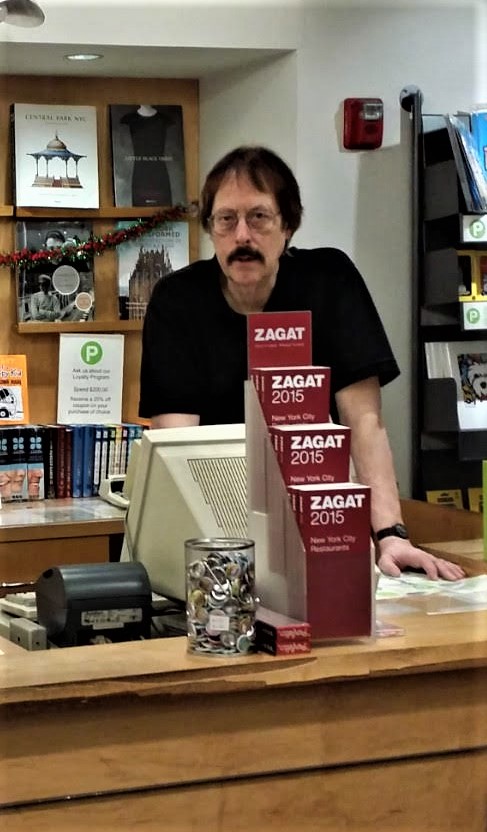The Bookstore Book: A Memoir
Ron Kolm
Pink Trees Press
In the 1960s and ’70s, there were an abundance of weird, somewhat shady jobs to be had; selling silk scarves on the street, passing out flyers for massage parlors, riding the subway hustling “Turkish silver” bracelets that turned the buyer’s arm green in an hour or two. New York writer Ron Kolm began his working life selling encyclopedias door-to-door in the poor neighborhoods outside Philadelphia. Thus begins The Bookstore Book, his chronicle of day jobs in the book world. Or, somewhat in the book world, at least.
“So, how can you help us?” you’d be asked. “Well, this
is about your kids,” you’d answer. “I would guess you’d want them to have a better life than you. Did you graduate from high school, Mr. Jones? Did you Mrs. Jones? No? Wouldn’t it be great if your kids did?” And this is where you would try to get the parent, or parents, to agree with you. The word for this procedure is “qualifying”—you would go for as many “yesses” as you could get. And then you came in with the pitch, “Two dimes a day, that’s all it would cost, two dimes a day in this tiny cardboard box, and you would soon have enough to buy this wonderful set of encyclopedias that would guarantee that your children would eventually make it through high school, and then go on to college. Just two dimes a day, that’s all.”
Kolm captures the carnival barker style hustle of those times flawlessly. Working a job that no longer exists, selling a product that no longer exists, to people whose dreams now sound hopelessly naive. As I read the first pages of this excellent book, I was carried back to those years; not the important historical events, but the day-to-day details that make up the fabric of our lives. Moments so easily forgotten, but that, for me, actually evoke the living past.
Like most newly arrived poets and novelists of that era, Kolm headed for New York City, and quickly made his way to the legendary Gotham Book Mart, a jam-packed literary treasure house located in the diamond district of West 47th Street.
“After several minutes of browsing through the Selected Letters of James Joyce, I approached one of the managers and inquired about the possibility of working there. ‘Sure,’ he replied. He turned and pointed to a very small table with a typewriter on it surrounded by many tall stacks of books. There was a tiny steel chair almost hidden beneath it. ‘If you can fit, you got the job.’ I couldn’t and didn’t, so I left, very disappointed.”
If someone in a hundred years wants to know what the Gotham Book Mart was, these few sentences capture it perfectly. The Bookstore Book is filled with such passages. The stories are at times journalistic, at times deeply personal, but always told in a way that pulls the reader straight in.
For years Kolm took the bus from New Jersey to the Strand with its 12 miles of dusty shelves, working side by side with Patti Smith and Tom Verlaine, both of whom make brief but noteworthy appearances in the book. There were brushes with the rich and famous—looking up to see Valerie Solanas on the other side of the counter selling used copies of her SCUM Manifesto, an argument with Charles Bukowski over whether to play punk or classical on the store speakers, a dust-up with a drunken Gregory Corso. And finally, an invitation to hobnob with Allen Ginsberg at a bar near New Morning books where Kolm worked nights.
Man, I got so excited! I was finally going to hear firsthand those rumored stories about wild sex in freight cars, drug-crazed nights in exotic Mexican jungles and gay hustling on the Four-O-Deuce. I locked up the store and joined the rest of the staff as we eagerly followed the poet across the street to the bar. But the conversation didn’t go at all the way I thought it would. Ginsberg proceeded to minutely detail for our enjoyment his book and record deals—how many tenths of a cent he got per copy of Howl sold.
It’s not only life on the job but also the life of a struggling writer that Kolm documents so vividly:
“The third part of this literary trifecta—first part; collecting material at work, second; organizing it on the bus ride home—began when I got back to the sleazy sub-division I lived in: this was the typing part, trying to come up with a couple of pages, even a couple of paragraphs, of serviceable prose. The bus stop where I got off was at a strip-mall parking lot near the two-storied box that contained the apartment.”
In much more than “serviceable” prose, Ron Kolm captures the unscripted moments of New York City life from the years before Instagram and TikTok, when anyone, famous, momentarily notorious, or unknown, could wander in and reveal something unexpected in the anonymous aisles of a bookstore.
“I love to tend the dying,”
he says, tugging
at my sleeve,
“And in the end
I always manage
a fine impromptu anguish.”
That might be my favorite passage of the many that I loved. A few moments with an unknown priest, for some reason driven to confide in the bookstore clerk, his rather strange motivations captured forever in The Bookstore Book.
Whether you lived in New York in the past 50 years, or only wonder what it might have been like, this is a book that will carry you into that lost world, and make you happy to know that at one time, it was all real.
Maggie Dubris (https://www.maggiedubris.com/) is a writer and sound artist based in New York City. She worked for 25 years as a 911 paramedic in the Times Square/Hell’s Kitchen area, as reflected in her 2019 book from SubPress, Brokedown Palace. She has also worked as a professional hypnotist, a martial arts health care specialist for Kids Kicking Cancer, a paramedic on film and TV sets, and, for most of the 1990s, was a main songwriter and guitarist for the all-female extravaganza Homer Erotic. Her latest chapbook, The Favored Child of the Sub-Mariner, has just come out from Weedmines Press (https://www.weedminespress.com/). Albie Mitchell photo.
Ron Kolm is a writer, bookseller, publisher, and more. He earned two degrees in history and channeled his historical bent to documenting New York City’s downtown poetry scene by collecting posters, small press and hand-made artifacts, and other downtown-alia. His archives were purchased by NYU’s Fales Library. Ron is author of The Plastic Factory, Welcome to the Barbecue, Divine Comedy, and many other books; editor of several anthologies; co-organizer of the downtown poetry collective, Unbearables. He lives in Astoria with his wife and two sons.



